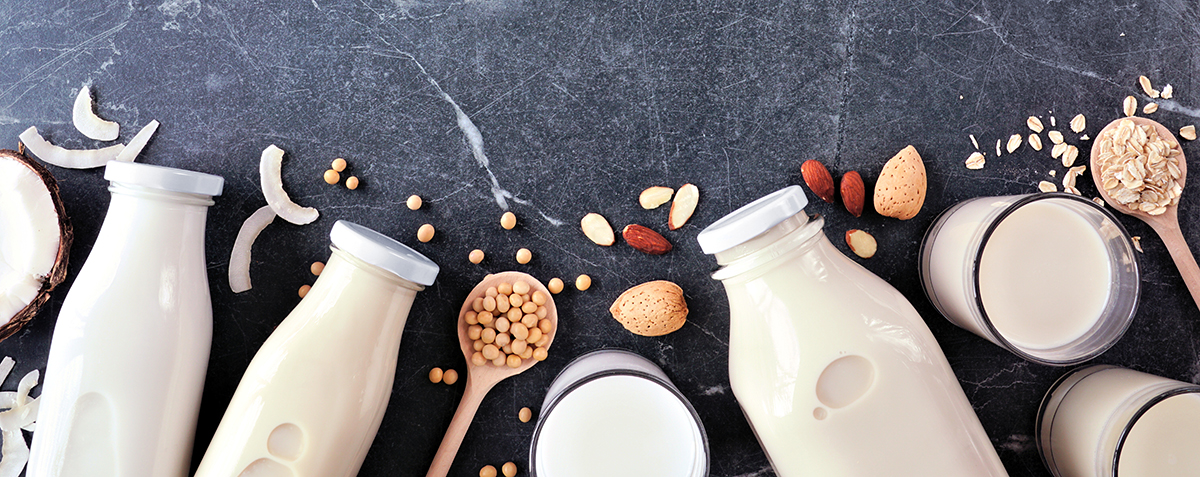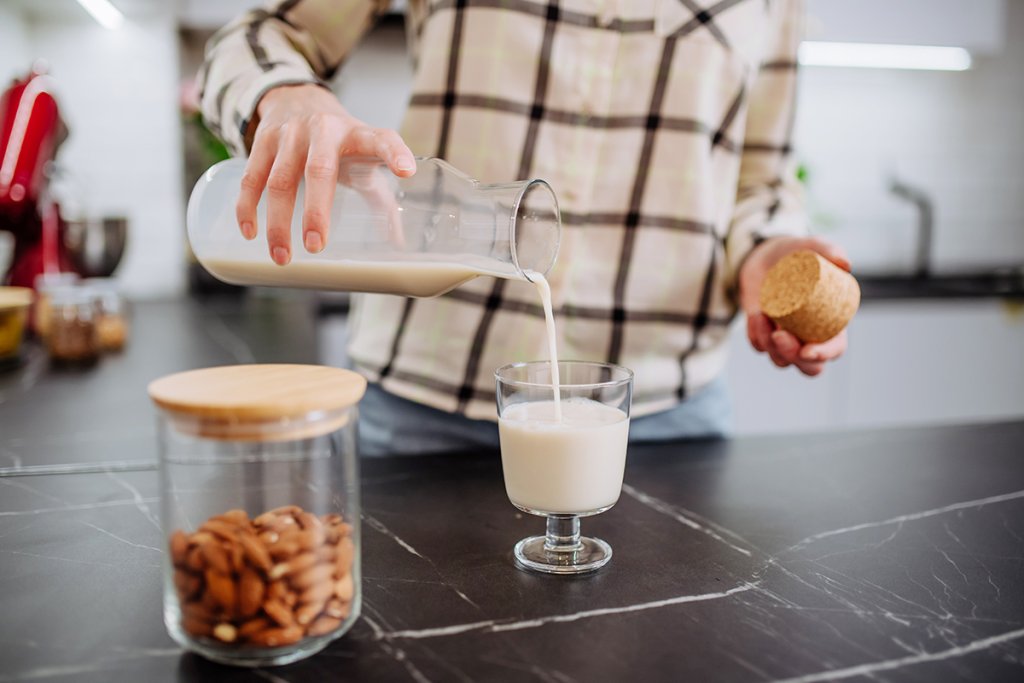Whether you splash it in your coffee, mix it into protein shakes, or use it for a bowl of cereal, milk is a dietary staple for many. And these days, there are more options than ever available in the grocery aisle.
But which milk is right for you? There are pros and cons to different types of milk, whether you’re reaching for traditional cow’s milk or plant-based milk alternatives. We’re exploring the different options available — and all the benefits they bring to the table — so you can find the healthiest milk for you.
What are the benefits of cow’s milk?
Before we jump into plant-based milk alternatives, let’s give a shout out to the OG — cow’s milk. After all, it’s packed with essential vitamins and nutrients that play a big role in our overall health. Here’s a quick rundown:
- Vitamin B-6: An essential B vitamin, B-6 can be hard to find naturally in most Western diets. Fortunately, milk is considered a good source of B-6, along with salmon, eggs, and other foods.
- Vitamin B-12: This beneficial vitamin is almost exclusively found in animal products, and milk is an excellent source. One cup of whole milk gives you a whopping 46% of your recommended dietary allowance (RDA) of B-12.
- Calcium: Not only is milk one of the best sources of calcium available, but it’s one of the most easily absorbed, since calcium is a large mineral that isn’t always easy to break down in the gut.
- Protein: Cow’s milk is considered a complete protein, because it contains nine of the essential amino acids. There are roughly 8 grams of protein in one cup of whole milk, making it an all-star choice for building and repairing muscles as well as providing a great source of energy.
- Selenium: One cup of whole milk delivers 13% of your RDA for this mineral — a key player in keeping your immune system and thyroid function in check.
- Phosphorous: This essential mineral helps repair and maintain tissues, cells, and bones; one cup of whole milk provides 22% of your RDA of phosphorous.
Some people prefer skim milk if they’re watching their saturated fat intake, while others prefer higher-fat milks in moderation. And as we’ve already mentioned, others skip cow’s milk altogether. Let’s explore why non-dairy milk options continue to rise in popularity, and how they stack up compared to their dairy companion.
Why are plant-based milk alternatives so popular?
Plant-based milk alternatives (PBMAs) are non-dairy milks made from — you guessed it — plants. That can also mean milks made from grains, legumes, seeds, and nuts. In recent years, PBMAs have become increasingly popular. According to the U.S. Department of Health and Human Services, in 2010, only 1 in 5 U.S. households bought PBMAs; by 2016 that rose to 1 in 3 households.

What are the main reasons people avoid dairy?
Switching from cow’s milk to plant-based alternatives is becoming more popular for many reasons, ranging from ethical concerns to personal preferences. Here are a few reasons someone might avoid dairy:
- Lactose intolerance: If you find that dairy gives you bloating or gas, you might be lactose intolerant. This means your body has trouble digesting lactose, a sugar found in dairy. Some people also have a dairy or milk allergy, which can cause more severe symptoms.
- Ethical concerns: Vegans choose not to ingest animal products, whether out of concern for animal welfare or environmental concerns related to dairy production.
- Health concerns: Some people may worry that dairy exacerbates different health conditions, such as arthritis or acne.
- Taste preference: Some people simply prefer the taste of dairy-free milk alternatives and trying new options to add more variety to their diet.
- Calorie count and nutrients: While plant-based milk alternatives tend to have less protein than cow’s milk, they also typically have fewer calories. Plus, some plant-based milks offer different benefits, such as the soluble fiber found in oat milk or the healthy, unsaturated fats found in almond milk.
Read on to learn more about the popular milk alternatives available, and which milk is the healthiest option for you!
6 Popular Plant-Based Milk Alternatives
When it comes to choosing the healthiest plant-based milk for you, it’s important to know what each of them brings to the table (literally!). Here’s a quick rundown of the most popular milk alternatives and how they might support different health goals.

1. Almond Milk
Almond milk is naturally low in calories and carbs, making it one of the healthiest milks for weight loss. It doesn’t pack the same protein punch as other options, though, so you’ll want to make sure you get enough protein from other dietary sources. Also note that sweetened versions will add on sugars or artificial flavors, so you may want to opt for unsweetened, depending on your goals.
In short:
One cup of unsweetened almond milk contains an average of:
- Calories: 40
- Carbs: 1.4 g
- Fat: 3 g
- Protein: 1 g
Best for: Weight maintenance
2. Coconut Milk
Not only does coconut milk have a richer flavor compared to some other options, but it’s also packed with potassium — a mineral known for helping to help regulate blood pressure.
While coconuts are in fat, their fat comes in the form of medium-chain saturated fatty acids (MCFAs). Research suggests that MCFAs can actually benefit everything from cholesterol levels to fighting Alzheimer’s disease. One MCFA in particular, called lauric acid, has been shown to contain antimicrobial and anti-inflammatory benefits that can even boost your immune system.
In short:
One cup of unsweetened coconut milk contains an average of:
- Calories: 50
- Carbs: 2 g
- Fat: 4 g
- Protein: Almost none
Best for: Giving your immune system a boost
3. Soy Milk
Soy milk has been in the milk alternative game for a long time, and for good reason: it’s a low-calorie option that’s also high in protein. One cup of soy milk boasts roughly 7 grams of protein — which is comparable to a glass of cow’s milk — but only 80 calories as opposed to cow’s milk, which ranges from 100 to 150 calories per cup, depending on whether you opt for 1%, 2%, or whole.
Some people are sensitive to soy, in which case, soy milk wouldn’t be the way to go. But for others, it’s an option that plays nicely with many different flavors, making it a worthy addition to iced coffee or your pre-workout protein shake.
In short:
One cup of unsweetened soy milk contains an average of:
- Calories: 80
- Carbs: 4 g
- Fat: 4 g
- Protein: 7 g
Best for: Protein intake
4. Rice Milk
Rice milk is the least allergenic of all the milk alternatives, as it doesn’t contain any of the 14 major food allergens. Though it’s low-fat, it doesn’t offer a significant amount of protein, clocking in at less than 1 gram of protein per serving. Some rice milks are fortified with calcium and vitamins, so be sure to compare brands to see which one may offer an additional boost of nutrition.
In short:
One cup of unsweetened rice milk contains an average of:
- Calories: 120
- Carbs: 22 g
- Fat: 2 g
- Protein: Almost none
Best for: Allergy sensitivities
5. Oat Milk
Oat milk is a great source of soluble fiber, which can support your gut health, help you feel fuller longer, and slow digestion. Soluble fiber may also help lower cholesterol and support your heart health.
Some brands of oat milk are also fortified with vitamins and minerals similar to traditional cow’s milk. Many people opt for oat milk for its taste and creamy consistency. However, the nutrition of oat milk can vary quite a bit by brand, so you’ll want to check the label.
In short:
One cup of unsweetened oat milk contains an average of:
- Calories: 40–120
- Carbs: 515 g
- Fat: 1–5 g
- Protein: 0–3 g
Best for: Increasing soluble fiber
6. Hemp Milk
Hemp milk doesn’t get the splashy PR that almond or oat milk may get, but it still has plenty to offer. With an earthy, nutty taste, it’s a flavorful option for cereal or coffee. Compared to a cup of whole cow’s milk, hemp milk typically has less protein and calories, but about the same amount of fat.
Since the fat found in hemp milk is mostly unsaturated — including heart-friendly omega 3s and omega 6s — it’s a solid choice for those looking for a heart-healthy option. Plus, hemp milk is rich in the nutrient arginine, which may be helpful in protecting against heart disease.
In short:
One cup of unsweetened hemp milk contains an average of:
- Calories: 60
- Carbs: 1.3 g
- Fat: 5 g
- Protein: 4 g
Best for: Heart-healthy diets
Which milk is the best for weight loss?
According to a study by NIH, unsweetened almond milk has the lowest calorie count of all alternative milks, making it a great choice if you’re trying to lose weight. Almonds are also a rich source of monounsaturated fatty acids (MUFA), which help keep you feeling fuller for longer — something that helps sticking to your weight goals a whole lot easier.
Which milk has the least amount of fat?
In general, rice, oat, and almond milks have the lowest fat content. But as we know, understanding the fat content of different types of milk is a slightly complicated subject, since all types of fat are not created equally.
The content of fat in cow’s milk obviously includes a range, since skim milk has none and whole milk has an average of 8 grams of fat per cup. And while milk alternatives have fat as well, for many it’s in the form of polyunsaturated fats or medium chain fatty acids (MCFAs), not saturated fats like dairy products contain.
Polyunsaturated fats may help reduce the level of “bad cholesterol” in your blood, which can lower your risk of heart attack and stroke. MCFAs may also offer cognitive-boosting benefits that can help prevent Alzheimer’s disease and other health issues.
Which milk has the least amount of sugar?
Cutting back on sugar is a great way to boost your overall health. Unsweetened almond milk has the least amount of sugar of all the milk options out there, clocking in at less than 2 grams of sugar per cup. If keeping an eye on your sugar intake is one of your nutrition goals, unsweetened almond milk is your best bet.
Which milk has the most calcium?
Sorry almond milk, you’ll have to sit this one out. When it comes to which milk delivers the most calcium, cow’s milk tops the list. Cow’s milk contains roughly 300 mg of calcium per cup.
But for those who can’t or don’t want dairy, it’s worth noting that some plant-based options like soy or rice milk are fortified with added calcium. Just be sure to check the labels so you can keep your bones strong and healthy.
Potential downsides of plant-based milk alternatives
The endless array of plant-based milks offer plenty of choices for those who prefer to steer clear of dairy — but be sure to do your research. Consider some of these potential drawbacks while weighing your options.
- Cost: Some PBMAs can be more expensive than traditional cow’s milk. Comparison shop for which brands offer the best nutrition while also being within your budget.
- Added ingredients: Read ingredient labels carefully, as different brands may include additives, making a harmless-on-its-own alternative into something filled with sugar or artificial ingredients.
- Recipes may not substitute the same: Double check before substituting a PBMA for cow’s milk in a recipe; it may not cook (or taste!) the same.
- Potential allergens: While dairy or milk allergies aren’t a concern with PBMAs, people who have tree nut allergies should steer clear of almond or coconut milk — and some people are sensitive to soy, too. There’s always a possibility your body may react to a new ingredient if you’re incorporating it into your diet suddenly, so just be mindful of how you feel after ingesting a new type of milk.

A final word on choosing the healthiest milk alternative for you
When it comes to finding what milk is best for you, choose the beverage that makes the most sense for your goals, nutrition preferences, and dietary needs — and that you enjoy the most! We can’t forget about taste.
Whether you’re looking to work more protein into your diet, lose weight, or cut back on sugar, there’s an option out there that can support your efforts. Just because almond milk or any other milk alternative is buzzy doesn’t necessarily mean it’s right for you. And just because you’ve been drinking cow’s milk your whole life doesn’t mean you can’t make the switch whenever you want. You’re allowed to change your mind — and go with your gut — to choose the option that best supports your individual health goals.
Head over to the Community tab in the free Anytime Fitness App to ask expert Coaches your fitness and nutrition questions.



